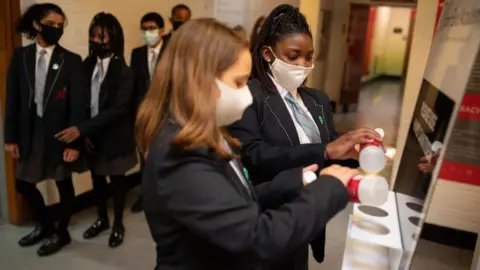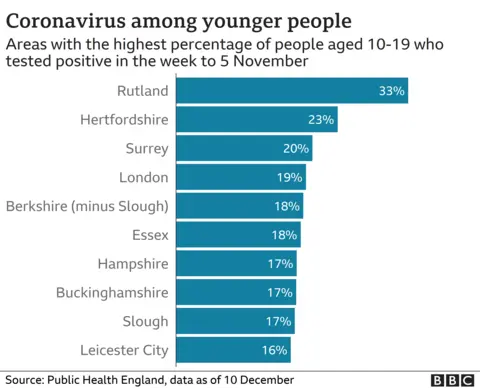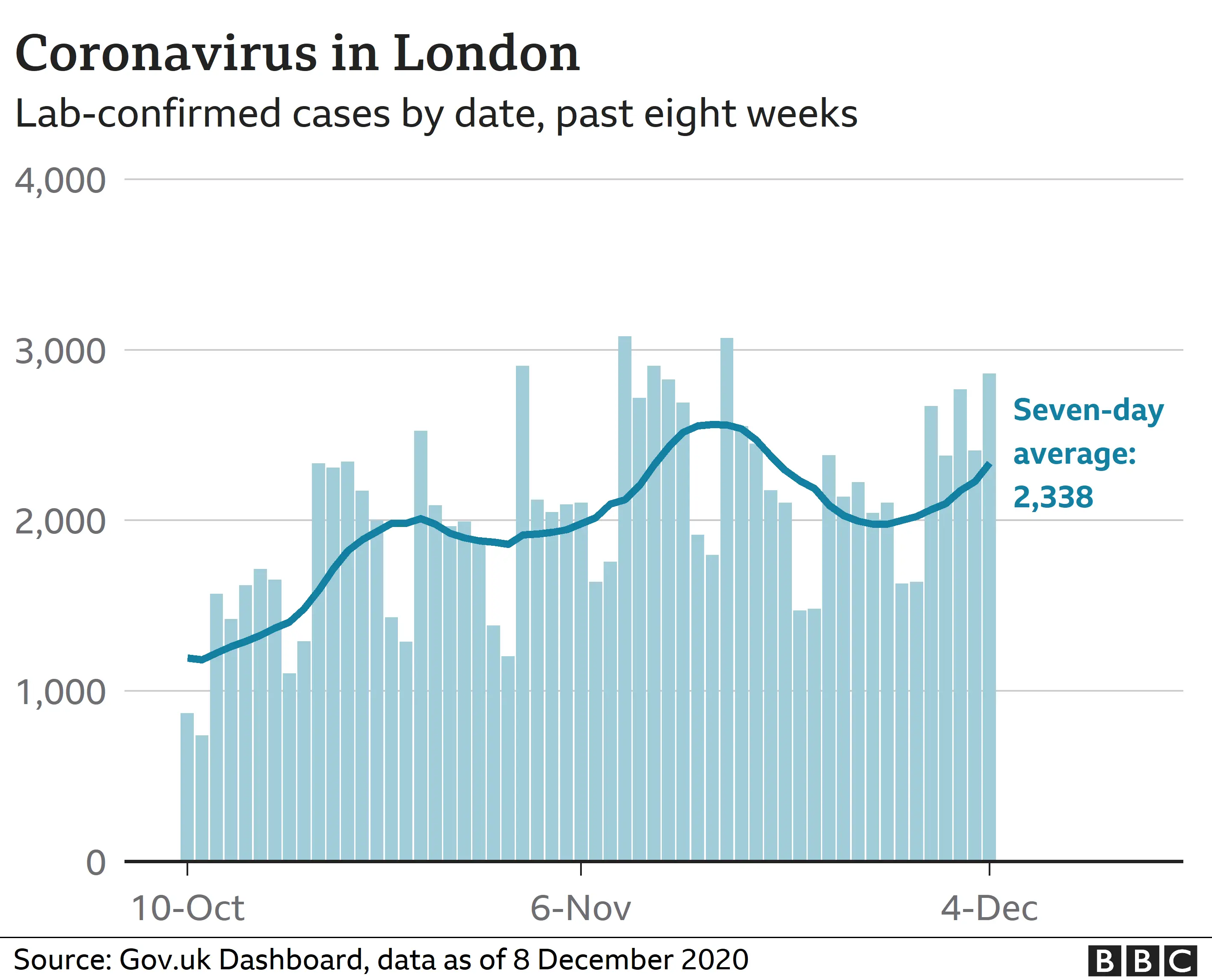Covid: Secondary school pupils in London, Kent and Essex hotspots urged to get tested
 Getty Images
Getty ImagesAll pupils, their families and teachers in parts of London, Kent and Essex should take a Covid test, Matt Hancock has said, as he set out a mass testing scheme for secondary schools.
Extra mobile testing units will be sent out after east London and parts of Kent and Essex became some of England's major coronavirus hotspots.
Cases in these areas have risen fast, especially among 11 to 18-year-olds.
One London head teacher said the extra tests had been "a long time coming".
Ges Smith, head teacher at Jo Richardson Community School in Dagenham, said he would "strongly encourage" his pupils to get tested but added: "As far as I know we have got no mandate on forcing students to take that test."
Health Secretary Matt Hancock said: "I urge every student, parent and teacher in these areas to step forward for testing - irrespective of whether they have symptoms. While Covid-19 may be lower risk to children and young people, it still poses a significant risk to their families and communities."
He said he wanted to keep schools and colleges open but needed to target rising infection rates.
Kevin Courtney, joint general secretary of the National Education Union, said many parts of the country had higher infection rates than the places where the secondary school mass testing scheme was being rolled out.
The government should commit to a rolling out mass testing for schools across the country, including to primary schools in areas where rates for those age groups were high.
A teacher from the Midlands, who asked to remain anonymous, said he was upset at the focus on London and the south east.
"It shows clear preferential treatment when London schools get offered mass testing, yet the Midlands and the North, which have been under massive pressure for months, have never been offered this mass testing," he told the BBC.
"Will they (the government) now roll out mass testing to other hard-hit areas in the North and Midlands?"
He said his school had "been under massive pressure" since reopening, "with close to 100 positive cases of both children and staff".
The government said all local authorities in England's top tier three of Covid restrictions had been invited to apply for a six-week community testing programme following a mass testing trial in Liverpool.
Mass testing aims to find people who might be infected but not yet displaying symptoms so they can be told to isolate.


Mass Covid testing is going to become an ever bigger part of the attempt to keep schools open - and expect to see much more of it in the new year, for staff and pupils.
But this latest intervention seems to be more about targeting young people in this secondary school age group, in these hotspot areas, rather than entire school year groups being screened.
It's community testing with a focus on the rising infection rates among young people, rather than head teachers organising mass testing in schools.
There will be 15 mobile testing units "in or near schools" in London, but it seems so far unlikely to be schools testing pupils in the way universities carried out mass testing of students.
This will also raise questions. If there are such concerns about this age group, why not send pupils home to study online for the last few days of term - as has happened in Wales?
There have been consistent warnings about Covid hitting attendance in schools - so why is this testing appearing now when the term is almost over?
And schools in northern England, struggling for months with high levels of infections, will be irritated at the sudden urgency of efforts to prevent London moving up to tier three restrictions.
There is also politics behind this. After a summer of U-turns, the government will do everything it can to keep schools open in England.

The areas receiving extra tests for secondary schools include:
- The seven worst-affected London boroughs, which are Barking and Dagenham, Hackney, Havering, Newham, Redbridge, Tower Hamlets and Waltham Forest
- The City of London
- The Essex areas of Southend, Basildon, Canvey Island, Harlow and Brentwood
- The Kent areas of Swale, Thanet and Maidstone
Mr Hancock said both PCR (a standard coronavirus test) and lateral flow testing - which takes about half an hour to show a result - would be used.

In a joint statement, the Department for Education and Department of Health said an extra 15 mobile testing units would be sent out in or near schools in the capital for staff, students and their families to be tested, providing about 75,000 tests.
And 44,000 home test kits will be made available for school staff to be tested before term begins in January.
In Essex, 10 mobile testing units will be deployed tomorrow and over the weekend, while Kent will have a further 12 mobile testing units by the start of next week.
Four of the affected London boroughs were among the 20 places with the highest case rates in last week, according to Public Health England. These were Havering (400.7 cases per 100,000 people), Barking and Dagenham (333.5), Waltham Forest (327.1) and Redbridge (310.3).


Some 21 of London's 32 boroughs have infection rates higher than overall rate for England of 150 cases per 100,000 people.
Taken together, London's outer boroughs have an infection rate of 205 cases per 100,000.
That is higher than the rate in Leicestershire, Tees Valley or Bristol, which are all under tier-three rules - the highest level - meaning people can only meet other households in outdoor public spaces such as parks, where the rule of six applies.

- SCHOOLS: What happens if pupils catch coronavirus?
- TESTING: How do I get a virus test?
- LOOK-UP TOOL: How many cases in your area?
- TEST AND TRACE: How does it work?
- TEACHERS: Are they are at risk?

Kent is in tier three but London and Essex are currently in tier two - meaning no household mixing is allowed indoors and the rule of six applies outdoors.
Mr Hancock urged Londoners to "stick by the rules" this week amid fears the capital might be moved into tier three when the tiers are reviewed next week.
About 99% of England's population are living in areas in the strictest two tiers of coronavirus rules, including more than 32 million in tier-two areas and more than 23 million in tier three.
Schools in England have been given permission to close a day early for the Christmas holidays to reduce the chances of teachers having to spend their time off speaking to contact tracers about potential Covid cases.
Meanwhile, more than 50 schools in Belfast have written to Northern Ireland's education minister urging him to reconsider his decision not to close schools early in the run-up to Christmas.
The Scottish government considered extending the Christmas school holidays to limit the spread of the virus after families get together during the festive period - but decided against it last week.
In Wales, all secondary schools and many primary schools will move classes online from Monday. Some teachers have criticised the move, saying they have had insufficient time to make arrangements.

- ALL DAY ENERGY MIX: 6 hours of motivating dance hits to keep you in the zone
- NEW PODCAST "I'M NOT A MONSTER": How did an American family end up in the heart of the ISIS caliphate?


What are your thoughts on the mass testing programme for secondary schools in the London, Kent and Essex hotspot? Share your views and experiences by emailing [email protected].
Please include a contact number if you are willing to speak to a BBC journalist. You can also get in touch in the following ways:
- WhatsApp: +44 7756 165803
- Tweet: @BBC_HaveYourSay
- Please read our terms & conditions and privacy policy
If you are reading this page and can't see the form you will need to visit the mobile version of the BBC website to submit your question or comment or you can email us at [email protected]. Please include your name, age and location with any submission.
